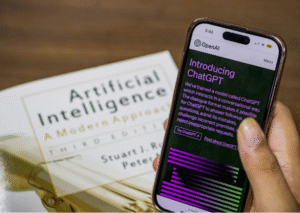
Compliance toh ho hi raha hai, why bother automating? If this is your thought, you are thinking it wrong. The real question isn’t whether you need automation; it’s how long you can survive without it. Manual compliance is like riding a bicycle in a Formula 1 race. It’s slow, error-prone, and, bhai, it doesn’t work anymore. Automation, powered by AI, takes care of repetitive tasks, ensures accuracy, and frees up your team to focus on real problems. In 2024, data breaches and regulatory penalties are no joke. You need AI tools for ISO 27001 compliance.
It will keep your business not just to keep up but to stay ahead. Let’s break it down—no boring corporate lingo, pakka. This is a straight-up, friendly guide to why automation is your best choice when it comes to managing ISO compliance.
Who Needs ISO 27001 Compliance?

If your organisation is a fortress, then ISO 27001 is the blueprint that ensures your walls are strong enough to keep cyber threats and data breaches at bay. It’s an internationally recognised standard for Information Security Management Systems (ISMS) designed to protect data confidentiality, integrity, and availability.
In simple terms, It’s not just about locking your doors; it’s about having a full-fledged security system in place to protect your organisation from potential disasters. The beauty of ISO 27001 is that it’s not limited to big corporations. Whether you’re a multinational IT giant or a small e-commerce startup, if you deal with sensitive data (and honestly, who doesn’t these days?), ISO 27001 is for you.
Here’s a breakdown of who benefits the most:
- IT and Tech Companies: For safeguarding intellectual property and client data.
- Healthcare Organizations: To protect patient records and comply with regulations like the Health Insurance Portability and Accountability Act (HIPAA).
- Financial Services: To avoid data breaches and meet compliance standards like the General Data Protection Regulation (GDPR).
- E-commerce Platforms: Because online transactions = sensitive customer data.
- Government Agencies: To ensure national-level data protection.
- Startups: Looking to win client trust and gain a competitive advantage in global markets.
But how will these organisations get the help of automation in compliance? Let’s find out.
Read Also: Best Paid AI Subscriptions for Software Engineers
How Automation Helps in ISO 27001 Compliance?
Implementing ISO 27001 compliance automation is a game-changer for businesses, simplifying tedious tasks, reducing errors, and ensuring that you’re always audit-ready. Here’s how automation makes your life easier:
1. Centralised Documentation Management
- What it Does: Automates the storage, retrieval, and updating of compliance documents like policies, risk assessments, and evidence for audits.
- Benefit: Ensures you always have the latest version handy and avoids the chaos of manual document tracking.
- Pro Tip: Use AI-powered tools to create, update, and store reports efficiently.
2. Real-Time Risk Monitoring
- What it Does: Automates risk assessments and continuously monitors your systems for vulnerabilities.
- Benefit: Identifies and mitigates risks before they escalate, ensuring uninterrupted compliance.
3. Automated Audit Preparation
- What it Does: Prepares compliance reports, tracks changes, and compiles audit-ready data in seconds.
- Benefit: Saves hours (or even days!) of manual prep time, ensuring accuracy and readiness.
4. Continuous Compliance Checks
- What it Does: AI tools conduct regular checks against ISO 27001 standards to ensure you remain compliant.
- Benefit: Eliminates human error and avoids last-minute panic before audits.
5. Training and Awareness
- What it Does: Automation tools can also help deploy interactive employee training modules.
- Benefit: Ensures everyone in the organisation understands compliance without manually tracking their progress.
From 2020, the ISO 27001 certificate has increased by 24.7%. Toh you understand that only relying on manual processes is outdated and risky. By using AI Tools for ISO 27001 compliance, businesses not only save time but also reduce the chance of costly penalties and data breaches. The future of compliance is automated—and it’s happening now! But which AI tools should you use? Let’s see which AI tools for ISO 27001 compliance are available in the market.
Read Also: AI in FinTech Companies in India
Best 5 AI Tools for ISO 27001 Compliance
Did you know that more than 40% of all breach incidents are insider threats? This makes ISO 27001 compliance more critical than ever. However, managing ISO 27001 standards manually can be a daunting task for any organisation. Fortunately, AI tools are stepping in to simplify the process, reduce errors, and ensure continuous compliance. Here’s a list of AI tools for ISO 27001 compliance that’ll make your life way easier.
1. Secusy
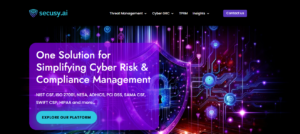
Advantages:
- Made for Indian businesses: Secusy understands the unique needs of Indian companies and aligns its services with the country’s regulatory landscape.
- Real-time monitoring: No more worrying about compliance updates. Secusy continuously monitors your business and provides real-time alerts.
Disadvantages:
- Customisations can be tricky: While Secusy is highly customisable, smaller businesses might find it a bit challenging to tweak everything perfectly.
- Pricing transparency: Not always upfront—pricing is usually tailored to business needs, so it’s best to get in touch for exact costs.
2. Kintent (TrustCloud)
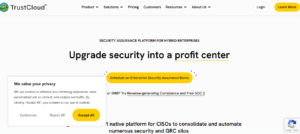
Advantages:
- Automated audits: No more manual audits! TrustCloud automates evidence collection, assessments, and reporting so you can stay focused on what matters.
- Integrates seamlessly: Works smoothly with platforms you probably already use (like Slack and JIRA), so you won’t have to worry about a tech overload.
Disadvantages:
- Mid to large-sized businesses: This tool is a bit more complex and probably better suited for businesses that have some tech and compliance resources.
- Learning curve: For first-timers, TrustCloud might feel a bit overwhelming, especially if your team isn’t already compliance-savvy.
3. CyberQ
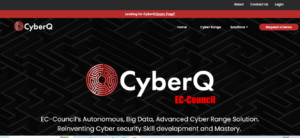
Advantages:
- Local expertise: CyberQ is India-centric, meaning it understands the ins and outs of our business environment and regulations.
- Multiple security frameworks: It covers not just ISO 27001 but other frameworks, too, so you’re ready for everything!
Disadvantages:
- Not the easiest to navigate: The user interface might be a little challenging for those who aren’t super tech-savvy.
- Custom pricing: You’ll need to get in touch for pricing details, as it’s tailored based on business size and requirements.
4. Secureframe
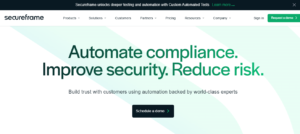
Advantages:
- Automated Compliance: Secureframe automates ISO 27001 documentation, policy generation, and evidence collection.
- Customizable: Adapts to your existing workflows and integrates seamlessly with other platforms.
- Audit-Ready: Provides continuous audit readiness and simplifies the entire compliance journey.
Disadvantages:
- Setup Cost: The initial setup and configuration might be expensive for small businesses.
- Limited Focus: Primarily designed for ISO 27001 compliance, with limited functionality for other regulations.
Pricing: Pricing begins at ₹75,000 per month for small businesses, with scalable plans for larger organisations.
5. OneTrust
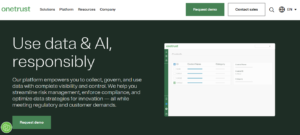
Advantages:
- Comprehensive Platform: OneTrust is an all-in-one solution that supports ISO 27001 compliance and other data security regulations like GDPR.
- AI-Powered Risk Management: Uses AI to assess and manage risks, ensuring that you’re compliant with ISO 27001 and other relevant standards.
- Scalable: Suitable for businesses of all sizes, making it a great choice for startups as well as large enterprises.
Disadvantages:
- Complex Interface: The platform might feel overwhelming for new users due to its wide range of features.
- High Cost: OneTrust is on the pricier side, especially for smaller businesses.
Pricing: OneTrust’s pricing starts at around ₹2,25,000 per month, with custom packages based on the business size and needs.
Which AI tools for 27001 Compliance are the Right Choice for you?
Choosing the best AI tools for ISO 27001 compliance in India depends on your organisation’s unique needs and scale. For startups or small businesses, tools like Secusy and CyberQ are tailored to Indian regulatory landscapes and offer cost-effective solutions. For larger enterprises or complex operations, platforms like OneTrust or Secureframe provide comprehensive and scalable compliance management.
No matter the size of your business, automating ISO 27001 compliance is critical in 2024 because of increasing cyber threats. These tools streamline audits, reduce risks, and help protect sensitive data while ensuring you stay ahead in India’s competitive business environment.
Also Read: Free AI Tools: The Ultimate Uncommon Tool List to Boost Creativity
Conclusion
Chalo, let’s be honest—managing ISO 27001 compliance manually feels like solving a Rubik’s cube blindfolded, hai na? But with these AI-powered tools, you’ve got a cheat sheet to ace the game while sipping chai!
Whether you’re a startup or a big-shot enterprise, these platforms take the “thakaan” out of compliance processes and let you focus on what really matters—growing your business.
So, ready to stop overthinking and start automating? Kyunki, jo automate nahi karega, woh aage kaise badega? Get your hands on these tools and ensure that compliance isn’t just a box you tick but a badge you proudly wear.
Now it’s your move—choose wisely!
Frequently Asked Questions
1. Do AI tools ensure 100% ISO 27001 compliance?
While AI tools automate many tasks and help maintain compliance, human oversight is still crucial for certain areas like policy enforcement and risk assessments. These tools simplify the process, but full compliance requires a proactive approach from the organisation.
2. Can AI tools integrate with existing systems for ISO 27001?
For Indian companies, tools like Secusy and OnetTrust help with real-time monitoring, automated risk assessments, and streamlined documentation. As businesses in India continue to expand their digital presence, adopting such tools ensures not only compliance with ISO 27001 but also enhances data security and operational efficiency. These integrations help businesses stay compliant while keeping costs low and management time minimal, even in an ever-evolving regulatory environment.
3. What type of businesses can benefit most from AI tools for ISO 27001?
AI tools are beneficial for businesses of all sizes. However, medium to large enterprises, especially those handling sensitive data, benefit the most as these tools offer scalability and efficiency in managing compliance across departments.
4. How often do AI tools for ISO 27001 need updates?
AI tools generally require periodic updates to adapt to new compliance requirements or regulatory changes. However, many platforms offer automatic updates, ensuring your security measures are always up to date without manual intervention.
5. Are AI tools for ISO 27001 compliance secure?
Yes, reputable AI tools adhere to the same security standards as ISO 27001. They use encryption, access controls, and other measures to ensure that the compliance data they handle is secure from potential threats.



